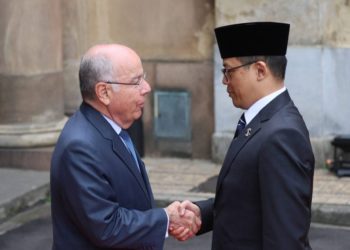Many of the Trump Administration’s recent actions, from its deployment of the National Guard and the Marines to Los Angeles to its military parade on June 14—which ostensibly commemorated the U.S. Army’s 250th year, but also happened to fall on the president’s birthday—threaten to politicize America’s military and erode civil-military relations.
In a speech at Fort Bragg, President Donald Trump attacked several Democratic politicians, including California Governor Gavin Newsom, Los Angeles Mayor Karen Bass, and former President Joe Biden, at times urging the crowd to boo his opponents. Such actions can create the impression that the military is currently serving partisan, not national, interests.
Such perceptions are dangerous. As Stephen Saideman, an expert on civil-military relations and democratic backsliding notes, “Impartial militaries are a key ingredient for stable democracy…Turning the U.S. military into an ally of one politician against his opponents is more than just another instance of democratic backsliding. It is a serious step toward ending American democracy.”
Protecting the legitimacy of the U.S. military is especially important during periods of partisan acrimony such as our current moment. History shows that American political leaders have tried to avoid dragging the military into partisan conflicts, because they understood the dangers. One episode from the 1990s reveals the importance of this practice, not only for safeguarding American democracy, but also for enabling the U.S. to take military action to protect American security in turbulent political times. It exposes why Trump might want to think twice about politicizing the military, despite the temptation.
Read More: What To Know About Trump’s Military Parade
On Dec. 16, 1998, President Bill Clinton launched Operation Desert Fox, an air attack against Iraq, which had failed to comply with United Nations Security Council resolutions and prevented U.N. weapons inspectors from accessing certain sites. The operation began the same day the House of Representatives was scheduled to vote to impeach the president over his scandal involving Monica Lewinsky.
Republicans, under the leadership of House Speaker Newt Gingrich, decried the administration’s campaign against Iraq, charging that Clinton was using Desert Fox to distract the nation from his pending impeachment. Senate Majority Leader Trent Lott denounced the administration’s plan, stating, “Both the timing and the policy are subject to question.” House Majority Leader Dick Armey of Texas echoed Lott’s comments, arguing, “After months of lies, the President has given millions of people around the world reason to doubt that he has sent Americans into battle for the right reasons.”
Recognizing that he needed congressional support for the operation and to counter perceptions that he was using the military for his own political benefit, Clinton dispatched his Defense Secretary, William S. Cohen, to address these charges and win support from congressional Republicans.
Cohen was ideally positioned to provide credibility for the administration’s operation. He had spent 23 years in the House and Senate, accumulating a record marked by independent action, bipartisanship, and a commitment to truth. Perhaps most importantly, he was a Republican.
By the time he entered the Clinton Administration, Cohen had established a reputation in Washington as a straight shooter, and a serious, thoughtful, and diligent policymaker. He had been in the public eye since his earliest days in the House of Representatives, when, as a member of the House Judiciary Committee, he broke with most Republicans to advance articles of impeachment against Richard Nixon during the Watergate crisis. In a speech on the House floor in 1974, he emphasized the value he placed on honesty, diligence, and fealty to the law. Amid charges that impeachment could rip the country apart, Cohen remarked, “I think what would tear the country apart would be to turn our backs on the facts and our responsibilities to ascertain them.” He emphasized that leaders needed to fulfill their commitment to the rule of law, proclaiming that “Our laws and our Constitution are and they must be more than a pious wish.”
In 1996, Cohen announced his retirement from the Senate after three terms, and Clinton made him Defense Secretary. As a member of the president’s foreign policy team, Cohen helped maintain the legitimacy of America’s military amid the partisan fireworks that defined the Clinton era.
As Clinton faced a decision about what to do over Iraq’s defiance of U.N. inspectors, he recognized that he would face questions about his motivations given that the House was moving toward impeaching him. According to Martin Indyk, who was serving as Assistant Secretary of State for Near Eastern Affairs, despite reassurance from senior foreign policy staff and cabinet members, Clinton worried, “There won’t be a single living soul in America who won’t believe I did this because of the impeachment.”
Read More: We Are Still Living in the Political Arena Ken Starr Helped Birth
But Cohen helped sway the president. In a Dec. 16 meeting between Clinton and his foreign policy team, the defense secretary pointed out that Clinton had initiated the plan to bomb Iraq more than a month in advance. “Four weeks ago you outlined to the world five things that Saddam Hussein had to do to avoid a military strike. He didn’t measure up in any category.” Cohen urged the president to move ahead, despite the inevitable criticism from Republicans.
According to Indyk, Cohen’s background as a Republican ensured that “his voice carried weight with the president.” When Cohen argued to the president that “If you don’t act here, the next argument will be that you’re paralyzed.” It proved persuasive, especially because Cohen was among the more dovish members of Clinton’s foreign policy team.
After Clinton announced the plan, Cohen and other foreign policy advisors convened a meeting with congressional leaders to demonstrate that the administration’s actions in Iraq had nothing to do with politics.
Gingrich called on members to assemble in the well of the House of Representatives in an executive session. “The atmosphere,” according to Cohen, “was sulfurous. A seething anger was visible on the faces of the members.”
But Cohen addressed the resentment and skepticism of his fellow Republicans head on. He stated “I am prepared to place 30 years of public service on the line to say the only factor that was important in this decision is what is in the American people’s interest. There were no other factors.” Cohen reassured the Republican House members, and by the time the session ended, “most members were on their feet and signaling their approval with applause.”
Following Cohen’s meeting with Gingrich and members of the House, they delayed the impeachment vote, holding off until the final day of the bombing campaign on Dec. 19.
The military respected Cohen’s willingness to protect the institution’s nonpartisan standing. Deputy Secretary of Defense John Hamre tells us that this moment was critical for “Insulating the [Defense] Department so that we were not put into awkward political things. It was making sure that we stayed really just a professional, nonpartisan organization. And it worked.”
This safeguarded the military’s credibility and enabled Clinton to protect American national security at a moment of partisan warfare.
The episode speaks to why Trump may not want to turn the military into a partisan player: doing so threatens the ability of a president to protect American national security. The bombing campaign against Iraq was only politically possible because Cohen had the credibility to assure his fellow Republicans and the nation that the military wasn’t acting to protect the president’s political interests.
Politicizing the military also endangers our democratic institutions. If officers are promoted based on loyalty instead of merit, then our fighting forces will be less effective. Using the military to quash peaceful protestors endangers the legitimacy of our armed forces in the eyes of the American public. If the Pentagon loses the ability to credibly claim that it is serving national, not partisan, interests, it puts us all—and our democracy—at risk.
Ryan LaRochelle is senior lecturer at the Cohen Institute for Leadership and Public Service at the University of Maine.
Kate Flynn graduated from the University of Maine with a B.A. in Political Science in 2024.
The post History Shows us Why a Non-Partisan U.S. Military is Essential appeared first on TIME.




